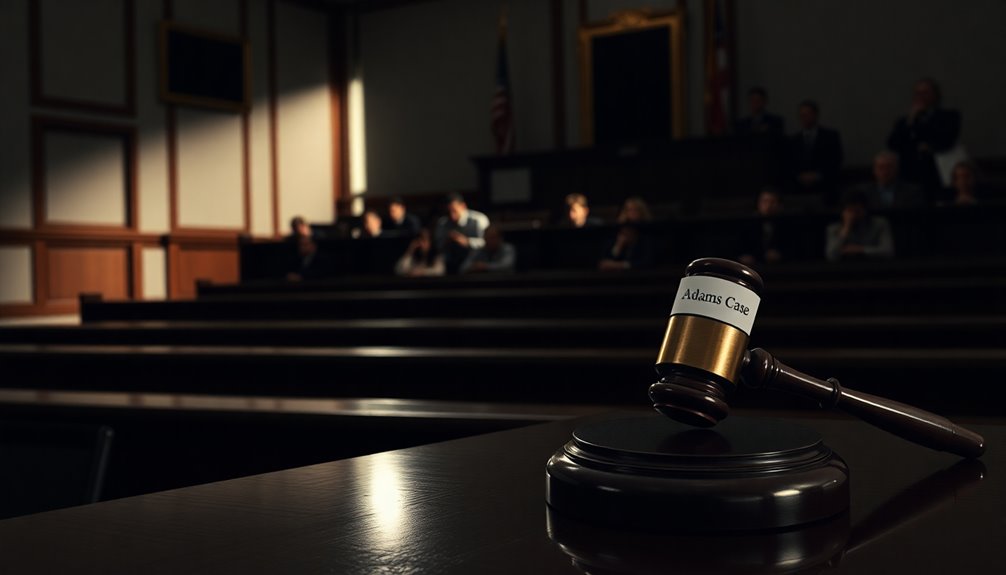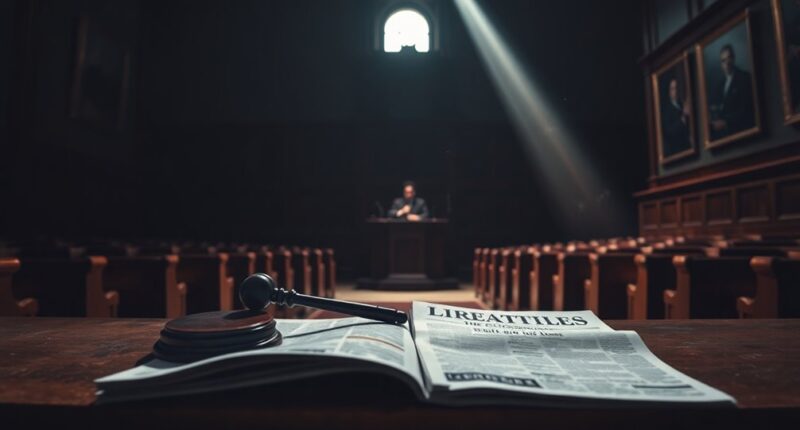In the wake of the Adams case, suspicions are rising about the Trump administration's tactics in weaponizing the justice system. Concerns over political interference and the erosion of legal integrity have surfaced, especially regarding aggressive policing and the expansion of the death penalty. The handling of cases like Adams raises ethical questions and highlights the potential for bias in prosecutorial decisions, leading to a declining public trust in justice. There's much more to uncover about these troubling developments.
Key Takeaways
- The Adams case exemplifies potential political interference in prosecutorial decisions, raising suspicions about the administration's motives.
- Allegations of quid pro quo suggest a troubling use of federal power to influence state and local prosecutions.
- The administration's expansion of the death penalty amid public opposition highlights ethical concerns regarding justice politicization.
- Resignations from top prosecutors indicate a crisis of integrity within the Department of Justice, undermining public trust.
- The planned reincarceration of individuals released during the pandemic may disproportionately affect marginalized communities, exacerbating existing racial inequalities.

The Trump administration's tactics have significantly reshaped the justice system, often prioritizing political agendas over legal principles. You can see this in the militarization of police, where law enforcement agencies received military-grade equipment, fostering aggressive policing practices that many find concerning.
The push for mass incarceration, including maximum sentences and the re-incarceration of thousands on home confinement, further emphasizes a troubling trend. This isn't just about increasing sentences; it's about reversing progress made in criminal justice reform, like the First Step Act.
The administration's expansion of the death penalty, despite rising public opposition, raises ethical questions. You might be aware of the handling of the Adams case, which highlights potential political interference in prosecutorial decisions, leading to allegations of quid pro quo.
It's alarming to think that federal prosecutorial power could pressure state and local prosecutors into adopting harsher sentencing practices. The potential reincarceration of individuals released to federal home confinement during the pandemic has raised significant concerns about the impact on communities and the justice system as a whole. The Department of Justice has faced resignations from top prosecutors, reminiscent of crises like the Saturday Night Massacre.
As you consider these developments, it's clear that public integrity is at risk. The notion that political priorities might outweigh legal merit could seriously undermine your faith in the justice system.
Even conservative critics express concern over the administration's tactics, suggesting a rare consensus on the politicization of justice.
Moreover, these policies could deepen racial inequalities, particularly through mass incarceration and the planned reincarceration of nearly 3,000 individuals released during the pandemic.
The ethical implications of the administration's execution spree during its last term are also troubling. Public perception of a politicized justice system is likely to erode trust, with legal experts warning of the long-term consequences.
As incidents like the Adams case unfold, they could escalate into major scandals, challenging the administration's credibility and further alienating you from a system that should be impartial and just.
Frequently Asked Questions
What Is the Adams Case About?
The Adams case revolves around New York City Mayor Eric Adams, who faced five counts, including bribery and conspiracy, in September.
You'll see that he pleaded not guilty, and the trial was set for April.
However, the Justice Department decided to instruct prosecutors to drop the charges.
This move has sparked discussions about fairness, public trust, and the integrity of the justice system, raising concerns about potential political influence on legal decisions.
How Does the Justice System Get Weaponized?
Weaponizing the justice system is like using a chess piece to attack rather than defend.
You'll see selective prosecutions, where cases are chosen for political gain rather than legal merit. Political opponents get targeted, often through biased narratives that sway public opinion.
Agencies can act on political directives, while grand juries breach confidentiality. This manipulation undermines justice, allowing those in power to maintain control and silence dissenting voices.
What Are the Implications for Future Administrations?
Future administrations will likely face significant challenges if the justice system gets politicized. You might see increased scrutiny over judicial decisions, leading to an erosion of public trust.
Prosecutors could feel pressured to make biased choices, undermining impartiality. Additionally, citizens might experience heightened surveillance and restrictions on free speech.
How Can Citizens Protect Their Rights During Investigations?
To protect your rights during investigations, always remember to assert your right to remain silent until you have legal counsel.
Stay calm and provide honest answers, but only with your attorney present.
Document interactions with law enforcement, noting badge numbers and witnesses.
If you feel your rights are violated, file a complaint or seek legal representation.
Staying informed about your rights and the legal process is crucial for safeguarding yourself in these situations.
What Role Does Public Opinion Play in These Tactics?
How much sway does public opinion really have on political tactics?
Public opinion plays a crucial role in shaping strategies, especially during high-profile legal cases. Politicians often gauge public sentiment to craft their messaging and adapt their legal approaches.
When the media amplifies certain narratives, it can influence how the public perceives the justice system, potentially swaying legal outcomes and driving political agendas.
Ultimately, your voice and opinion matter in this dynamic.
Conclusion
In light of the Adams case, it's hard not to wonder: is the justice system becoming a pawn in a political game? The Trump administration's tactics raise serious questions about fairness and accountability. As suspicions mount, we must ask ourselves: what price are we willing to pay for power? It's time to stand vigilant, ensuring that justice isn't just an illusion in the shadows of ambition, but a beacon of hope for all.








